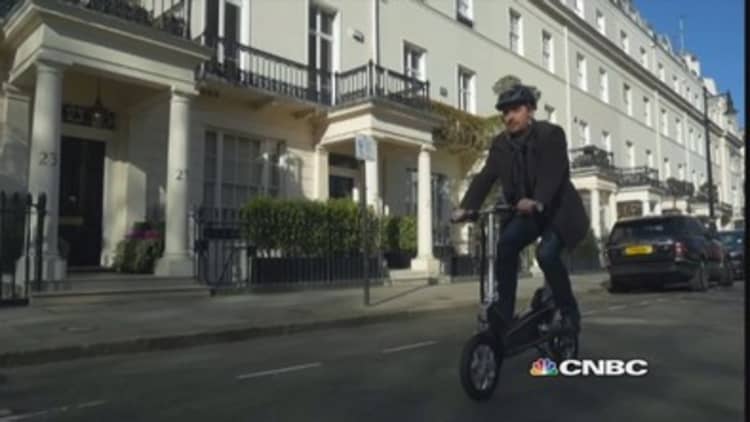Sebastian Schlebusch's dream of riding public bicycles through the clogged, fume-filled streets of Delhi while as a foreign student in India almost a decade ago is coming ever closer to reality.
Now director for international business development at Nextbike, a supplier of bike-rental systems, Schlebusch is advising on projects as up to eight cities in the world's second-most populated country consider bike-sharing plans. The schemes would follow on others abroad that have helped cut traffic and pollution and, ultimately, make for happier residents.
"When I spoke five years ago to Indians about bike sharing, they would laugh at me,'' Schlebusch said in an interview from Dusseldorf. "Now not only they are not laughing, but those responsible for urban planning are seriously considering projects.''
Schlebusch's dream may not be an easy one to fulfill. Attempts in recent years to start schemes in India have failed, largely due to lack of government support. Under-investment in road infrastructure and cultural disengagement with the bicycle among the country's middle class further hinders the task.

Bicycle schemes are thriving around the world as they become smarter with computers and mobile communications. There are more than 800 cities in 56 countries operating such systems, according to the Earth Policy Institute in Washington, D.C., and they could provide a vital solution to densely populated cities like Mumbai and Bangalore.
India has flirted with bicycle sharing since a national transport plan in 2006 called for "moving people rather than vehicles.'' Still, no large bike program has materialized.
There were an estimated 120 public bikes available in the country last year, belonging to private initiatives, before some schemes closed down. By comparison, Belgium, a country whose population is 100 times smaller, has 5,690 bikes. Neighboring China is the world's largest shared-bike market with a fleet of 858,000.
Read MoreThe $500,000 gold mountain bike
"There are some initiatives, but if the government's role is still very limited, how can you bring the culture of cycling?'' said Kumar Manish, founder of Urban Voices, a platform to promote urban mobility based in Ahmedabad and one of several groups advocating to implement public cycling in the country.
The Delhi Development Authority announced last August plans to implement the first computerized bike-sharing system in the residential area ofDwarka within 18 months. The city of Pune has launched a public tender for a bike-sharing scheme, while Chennai and Jaipur are among other cities now looking into projects.
Cycle Chalao!, a private venture started in 2010 in Mumbai obtained a concession by the municipality of Pune in 2011 to establish a network in the city. Chalao! Closed down shortly after when funding dried up, writing on its blog that "bicycle sharing systems to be successful in India have to be fully sponsored by the public authorities.''
So-called third-generation bike-sharing schemes, which track bike and user through electronic racks or locks, chip cards, and the Internet, first appeared in France less than a decade ago. The first launches took place in the cities of Rennes and Lyon, and Paris introduced Velib' in 2007, now the world's second-largest operation.
The economic attractions of cycling are "compelling,'' says Janet Larsen, director of research at the Earth Policy Institute. Replacing a car for a bike cuts use of steel, aluminum, plastic, and rubber from 4,000 pounds to 30 pounds, her team estimates. They also conclude that one car's parking spot can accommodate 20 bicycles, freeing up land. A University of Melbourne study and analysis of bike sharing in New York have showed cycling generates more consumer spending from extra savings and from better access to commercial areas.
Read MoreYoung, affluent drivers buy these cars
"It also benefits taxpayers simply because the road maintenance required for a bicycle is minuscule compared with that for a car,'' Larsen adds.
The schemes, and a cultural shift towards appreciating the relative benefits of riding, have propelled cycling in recent years. Bike commuting expanded 38 percent across the U.S. in the past decade, according to the Earth Policy Institute, and sales of bikes and cars in the country famous for highways are now head-to-head. Italy sold more bikes than cars in 2011 for the first time since World War II. Cycling helps reduce death risks because of the exercise involved, while it cuts carbon dioxide emissions, according to the British Medical Journal.
A big obstacle in India is the perception that bicycles are for the poor man.
"India's private vehicle ownership is increasing day by day, there is a lot of pressure coming on the road,'' Manish at Urban Voices said. "Indians don't see cycling as an inspiring thing. Cycling is seen as, `you don't have money to buy a car.''' The country's motor vehicle ownership rate is 18 people per 1,000, according to World Bank data compiled by the Earth Policy Institute. That compares with 786 for the U.S. or 588 for Japan.
Schlebusch at Nextbike is optimistic.
"There is a young generation who are massively advocating to change the focus in transport planning,'' he says. "The challenge now is getting it right.''




